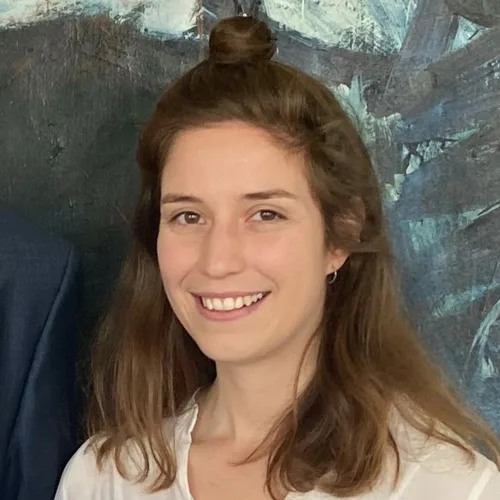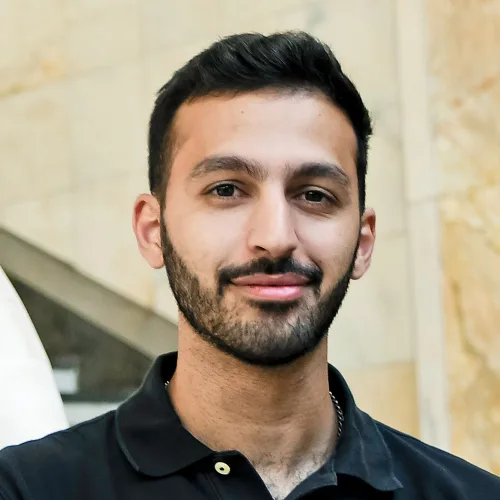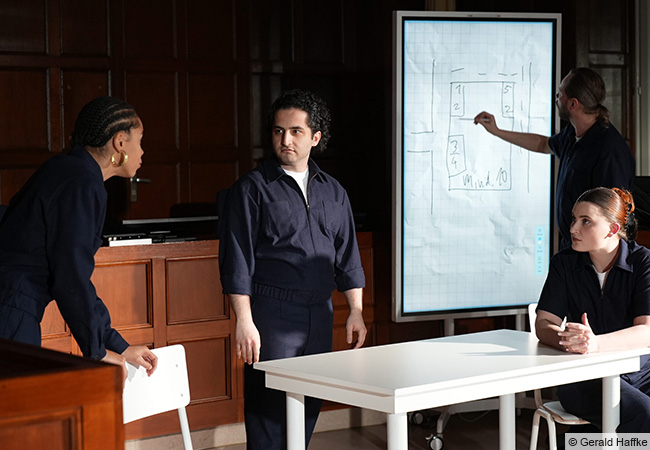Yuli Ketain Meiri and George Atmeh are both M.A. students from Israel. Yuli conducts her studies in social work at The Hebrew University of Jerusalem and spent four months at Goethe University this summer. George is studying neuroscience at Tel Aviv University and spent six weeks at Goethe University. We spoke to them about their experiences as our first GREP-fellows.

Tell us about your research topic.
Yuli: During my four-month stay at Goethe University, I was writing my master thesis in social work about “The subjective wellbeing of children with same sex parents” under the supervision of Professor Sabine Andresen. I used my time here in Frankfurt to write the proposal for my master thesis in order to hand it in when I am back in Tel Aviv.

George: My research topic is exploring the effects of Alzheimer’s disease on protein distribution in the blood brain barrier. The assumption is that early-onset Alzheimer’s affects the blood distribution in the brain, weakens the barrier and allows toxic reagents to enter the brain – thereby furthering the deterioration of the disease. Put in laymen’s terms, I am exploring something called the blood brain barrier within Alzheimer’s disease within patients. At Goethe University I participated in a six-week elective module that is part of the M.A. in Interdisciplinary Neuroscience. I worked under the supervision of Professor Jasmin Hefendehl and close guidance of PhD student Murphy DeMeglio. Whenever I had questions, Prof. Hefendehl would gladly sit down and speak to me.
The interview was conducted in September 2023, shortly before Yuli and George finished their research stay at Goethe University Frankfurt and ahead of the October 7 terrorist attacks in Israel. The shocking events in the region have left us deeply shaken. Goethe University Frankfurt strongly condemns all forms of terrorism and inhumane acts of violence, and our thoughts are with Yuli and George and everyone else affected.
How did your daily work routine look like?
Yuli: I am a morning person, so I went to university on Campus Westend at around nine or eight a.m. from Monday to Thursday. I had weekly meetings with Professor Andresen, we talked about the progress of my research and she gave me a lot of advice. I also talked to my supervisor in Israel. Since I didn’t have to attend any classes, I was able to concentrate fully on my thesis, which was very good.
George: I would wake up at around eight a.m. to be at Campus Riedberg at around nine a.m. and work until two or five p.m. What I did here is a bit different to what I am doing at Tel Aviv University, where I work on a different disease called Huntington’s, and conduct my research on a day-to-day basis. Molecular experiments take less time but there are more experiments to do. My research here focused on histology. Therefore, the experiments and their analyses took longer.
What was your aim in participating in GREP?
Yuli: I knew Professor Andresen and I wanted the opportunity to study from her specifically. As a GREP-fellow I had the chance to work on my thesis and have close guidance. I learned a lot and established valuable academic connections – for me it was amazing.
George: It was purely professional, because I would like to continue with a PhD in neuroscience. There are good PhD options in Israel but many good options abroad. Germany is a prominent location to go to, since there are many job offers, good living conditions, etc. The commitment for a PhD is five years and research can be challenging sometimes as it doesn’t always work out like you want it to. It can be frustrating and you need to know if you can deal with that failure in a particular environment. GREP also provided me with immediately tangible benefits. Let me explain: GREP helped me in present time. I am still doing my M.A. and during my studies, I am required to learn new methods and new ways to do science. It was very beneficial to me that my research at Goethe University took place in a controlled environment, because this way I was able to pick up new things that I am not able to do back home. I tried to learn as much as I can here in order to implement the new knowledge in my M.A. or a future PhD.
Would you have considered a longer stay?
George: Yes, definitely. I feel that four to six weeks is not enough. Experiments can easily go wrong, and you might need a week to figure out why and do the whole thing again. Since the M.A. structure in Israel is different to the one here, I had to be back for the new semester. However, I would recommend coming here for a longer period if possible. It also took me a long time to acclimatize to cultural norms.
What did you do after a long workday?
Yuli: In the summer, there were many festivals in and around the city of Frankfurt, but mostly, I would sit together with friends from the working group, go for a walk or grab a beer somewhere and relax. As I was working with them every day, we became close friends.
George: I was in Frankfurt city on the weekends to meet friends from the lab or people I met at the guesthouse, where I stayed in Bad Vilbel. I also got the chance to get out of Frankfurt to visit friends in Munich and Düsseldorf.
Interviewers: Leonora Jürgens and Lisa Pfeiffer, Global Office
Goethe Research Experience Program (GREP) Scholarships
Aimed at outstanding international undergraduate and master students, the fellowship supports a two- to six-month research stay at Goethe University, during which recipients can either work on their thesis or dissertation or, in selected master programs in the natural sciences, complete a laboratory internship. Working closely together with researchers in interdisciplinary research groups, the students are able to expand their scientific and cultural competencies.
Fellowship holders receive a service package that includes accommodation and free access to university facilities. They also have the option of joining a German language course at Goethe-Institute Frankfurt and an exclusive social program.
Further information on the Goethe Research Experience Program: www.goethe.link/grep







